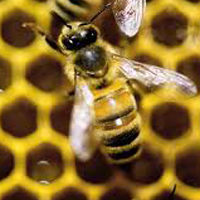There is much excitement in the newspapers and on the radio and TV about the mysterious disappearing honeybees. Many people were not aware of this, but it is true that one-third of our food depends on honeybees for pollination.
As agriculture is practiced now in our country, bees are essential for many crops. Native insect pollinators can take care of a backyard garden, but 20 acres of cucumbers all blooming at once require that bees be brought in, and taken out again, so that the crops can first be pollinated and then sprayed for insect pests.
A quarter of the hives in the country have been lost. It is a serious situation. Bees disappear from the hive, but there are no dead bees around the hive. All that is left is the queen with a few very young bees. The hive has honey and pollen and baby bees in the brood comb. Other bees will not come and rob the honey as they usually do with a weak hive.
Researchers are trying to find the reason for this disappearance. Several things have been suggested: disease, parasites, malnutrition, insecticides and genetically engineered crops. Last week, I saw in the newspaper an Associated Press article reporting from the U.S. Department of Agriculture Beltsville Lab in Maryland, suggesting that the latest experiments show that the cause is disease. If it is disease, no one is to blame and the products involved in insecticides or genetic engineering will not be removed from the market.
When government agencies issue reports, they are quick to say that they are not investigating genetically engineered crops. They say this because many people have suggested that this may be the cause of the hive collapse.
Genetically engineered corn, brought to us by Monsanto, has genes from the bacteria bacillus thuringiensis added to it. Bacillus thuringiensis has been used by organic gardeners so they can avoid chemical insecticides. These bacteria make the insects sick and they die. Bees that are trucked around the country are often fed high-fructose corn syrup. This syrup could have bacillus thuringiensis in it. The Sierra Club wrote a letter to Sen. Tom Harkin (D-Iowa), chairman of the Senate Agriculture Committee, saying that genetically engineered crops should be investigated as the cause of bee colony collapse. The letter cited 12 articles on the topic, including a 2002 article in Harper’s Magazine by Barry Commoner.
Insecticides are also a suspect. There is a lot of information about one insecticide, imidacloprid, which uses nicotine. Made by Bayer, it is often sold under the trade name Premise. It is used to fight termites and treat seeds and ground. It has been found that this insecticide goes up into the plant and into the nectar and pollen. When termites are treated with it, they become disoriented and don’t know what to do or which way to go.
If the bees are getting a dose of this from flowers, that may be the reason they fly off and don’t know their way home. Beekeepers in France were successful in getting this insecticide banned in their country, where it was sold under the trade name Gaucho. Bayer fought the ban, but was unsuccessful.
We know that government scientists in other fields have been censored lest they say something not in line with Bush administration ideology. As beekeepers, and as human beings, we hope that government scientists will not neglect any suspect causes of this serious situation.
Pam Wright and her husband are longtime beekeepers in Missouri.










